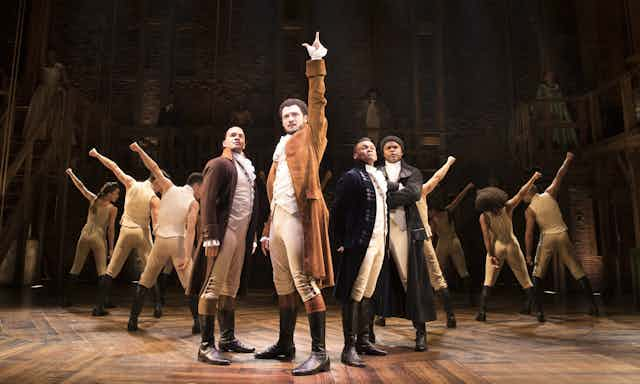The ship is in the harbour now
See if you can spot him
Another immigrant
Comin’ up from the bottom.
To no one’s surprise, the American musical theatre phenomenon Hamilton dominated this year’s Oliviers, picking up seven awards. This was in line with its success in the 2016 Tonys, where it collected 11 awards.
The show came to the Victoria Palace Theatre in London in November 2017, weighted with the expectation that it would replicate the success of its New York run – and measured by both box office performance and critical adulation, that expectation has been met.
But the success of this show for English audiences was never inevitable. The premise of Hamilton was always an unlikely one. A rap musical based on the life of the first US secretary of the treasury hardly seemed like the basis of a musical that would become the hottest ticket in town. Lin-Manual Miranda’s brilliance as creator of the show was not only based on his lyrical exuberance and musical styling, but on his ability to find dramatic material in political meetings and budget negotiations. In Hamilton these matter as much as love stories and duels.
Beating up the Brits
But if this was unlikely material to woo an American audience, then how much more unlikely was it that British audiences would succumb to the charms of material so rooted in the minutiae of the history of the founding of America? And there is another challenge to this show as it makes its way across the Atlantic. While US audiences might be able to celebrate the story of the founding of their nation, British audiences must see themselves cast as the villains of the piece.
Hamilton’s adversary may be the vice-president, Aaron Burr – with whom he had a long-running feud and who was to eventually kill him in a duel – but the chief struggle of Hamilton and his fellow revolutionaries is against the colonial oppressor: Britain. This is personified in the form of George III, who is presented as a comic caricature, stiffly wrapped in royal dress and impractical crown, petulantly objecting to America’s pleas for greater self-determination:
Oceans rise, empires fall/ We have seen each other through it all/ And when push comes to shove/ I will send a fully armed battalion,/ to remind you of my love.
As cinema audiences embrace narratives of Britain defying the odds (Dunkirk, Darkest Hour), the musical stage seems instead to have turned to a story which celebrates plucky Americans beating the British.
The melting pot
But the real brilliance of Hamilton always lay in its attitude to diversity. Casting is not of the colour blind variety that disappoints the Daily Mail’s theatre critic. On the contrary, this show delights in its casting of non-white actors, and in its celebration of the melting pot: “Look how far I come/ Immigrants. We get the job done.”
Alexander Hamilton is, for Miranda, not a patrician founding father, but a pushy young man fighting to establish himself in a foreign culture (“In New York you can be a new man”).
This message of diversity is the one that was embraced by the Obamas – Michelle Obama referred to Hamilton as “simply, the best piece of art in any form that I have ever seen in my life”. And it put the New York cast at odds with the Trump administration when, on the verge of taking office, Mike Pence saw the show. At the curtain call, Brandon Victor Dixon, who played Burr, addressed the vice-president elect.
We, sir — we — are the diverse America who are alarmed and anxious that your new administration will not protect us, our planet, our children, our parents, or defend us and uphold our inalienable rights. We truly hope that this show has inspired you to uphold our American values and to work on behalf of all of us.
Read more: Booing Mike Pence at Hamilton echoes theatrical politics of the founding fathers
As this was delivered the audience booed Pence. The next day Hamilton was granted the ultimate cultural accolade: a Twitter assault from Donald Trump.
Celebrating diversity
In Trump’s America, the message of Hamilton took on a new urgency for liberal audiences. And it is in this context that the show opens in Britain. Nigel Farage co-opted Christopher Nolan’s Dunkirk as – presumably – a message about British independence and the untrustworthiness of those from the Continent. But it would be hard for anyone to read Hamilton as anything other than a plea for tolerance of otherness and a celebration of racial diversity.
Except for the Daily Mail. Step forward Quentin Letts:
As the first-ever secretary to the treasury he established the banking and credit system required by the emerging federation of states. That aspect of the story has a topical edge given Brexit. Hamilton was also a firm believer in his nation’s sovereignty. Would he have been a Leaver or a Remainer in 21st-century Britain? Hard to say.
Audiences would disagree. The line: “Immigrants, they get the job done”, is regularly met by spontaneous applause by British audiences. This is a show that feels timely and urgent.

